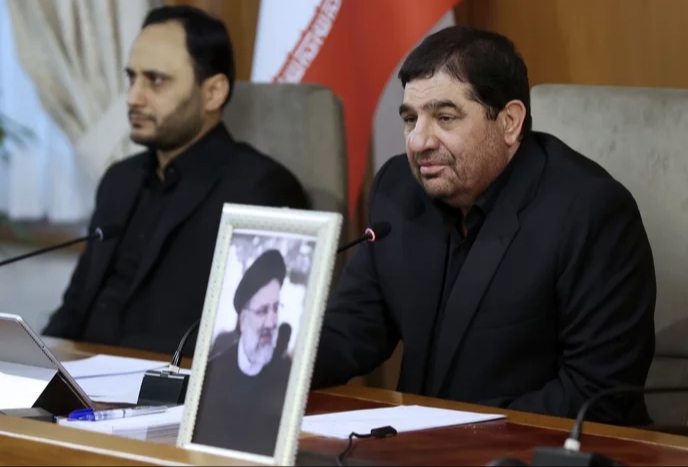
Mohammad Mokhber
Iran names Mohammad Mokhber interim president
Following the death of Iranian President Ebrahim Raisi, Foreign Minister Hossein Amirabdollahian and several other government officials in a helicopter crash on Sunday, a new interim President has been named. He is Mohammad Mokhber.
After their deaths were confirmed by state media on Monday, Iran’s supreme leader, Ali Khamenei — who is the highest-ranking political and religious leader in the republic — announced five days of mourning and a new interim president: Mohammad Mokhber.
The president is Iran’s second-ranking — but top-elected — official. Mokhber is expected to hold that role temporarily since Iran’s constitution requires that a new election must be held within 50 days of the death of a sitting president.
Robin Wright, a joint fellow at the U.S. Institute of Peace and the Wilson Center, says Raisi’s death may not shake up the day-to-day running of the country, but rather its longer-term future, as the hardliner was widely considered a potential successor to 85-year-old Khamenei.
“There will be a process that’s in place, they will find a new president, but the scramble behind the scenes will be very, very interesting,” she said in a report.
Mokhber, 68, is part of the three-person council charged with organizing that election.
At a Monday meeting, he urged top Iranian officials to continue their work without disruption, the Washington Post reported.
“The framework and foundations of the system are strong, and there will not be the slightest problem in the administration of the country under the permanent shadow of the leadership,” Mokhber said.
He most recently served as first vice president of Iran, the most senior of a dozen such positions. He’s kept a relatively low profile despite holding a series of prominent roles in Iran’s government and charitable foundations, including those with ties to Khamenei, and has been sanctioned by both the U.S. and European Union.
Mokhber, who holds a Ph.D. in international law, was appointed first vice president when Raisi was elected in 2021.
According to the revised Iranian constitution of 1989, the president’s first deputy can be tasked with “the responsibilities of administering the affairs of the Council of Ministers and coordination of functions of other deputies,” with the president’s approval.
The first vice president will also assume — with the approval of the supreme leader — the “powers and functions” of the president in the case of their death, dismissal or absence.
“The Council, consisting of the Speaker of the Islamic Consultative Assembly, head of the judicial power, and the first deputy of the President, is obliged to arrange for a new President to be elected within a maximum period of fifty days,” reads Article 131.
In his role as first vice president, Mokhber traveled within Iran to shore up political support, including visiting the site of a 2022 building collapse that killed dozens and fueled accusations of corruption against those involved in the permitting process. He also had a hand in international diplomacy, receiving visiting leaders from places like Syria and China.
Vice presidents tend to hold a relatively low profile in Iran, though Mokhber did generate some headlines during his tenure
He was part of a team of Iranian security officials who visited Moscow in October 2022, months into Russia’s war with Ukraine, to discuss weapons deliveries. Reuters reported that the group agreed to provide more surface-to-surface missiles and drones to Russia’s military.
The Washington Post reported that during that visit, Mokhber blamed NATO for the killing of Ukrainians and proposed an Iranian-Russian working group to undermine Western sanctions.
“We have been under these sanctions for 40 years and did not allow them to undermine the government of the country or to seriously affect us,” he said of Iran, suggesting they had much to teach Moscow.
